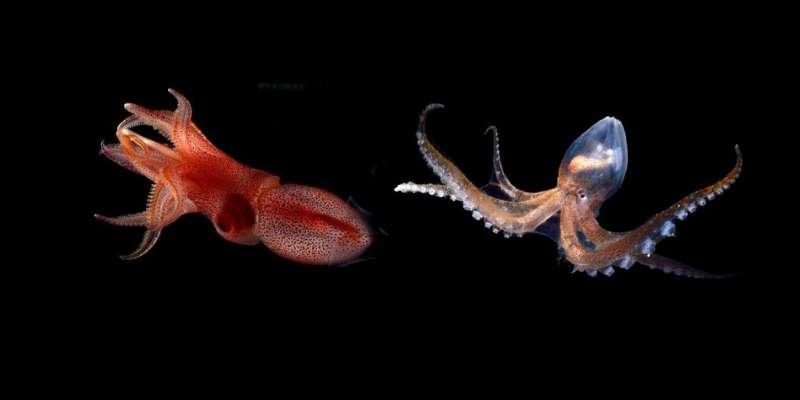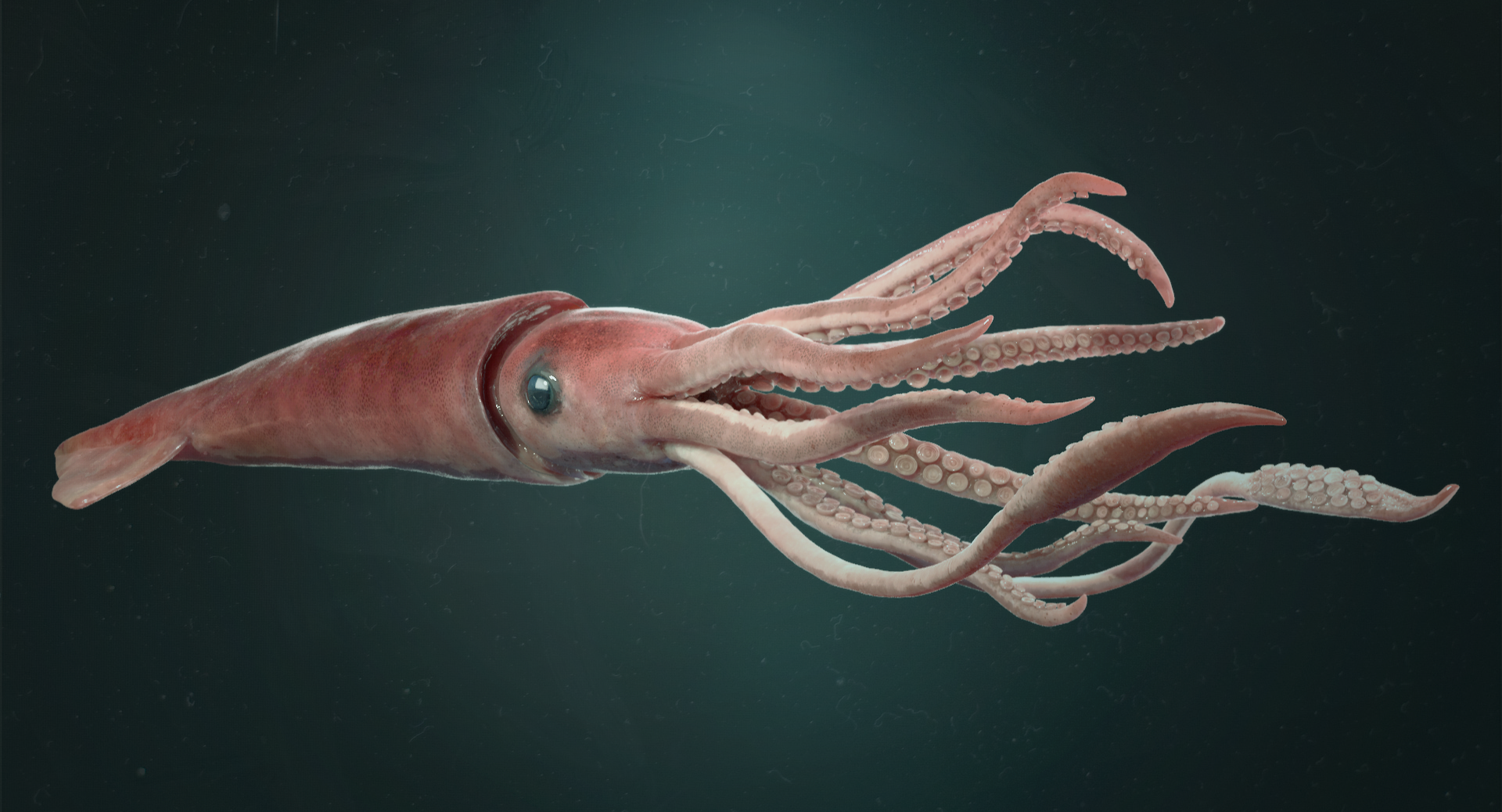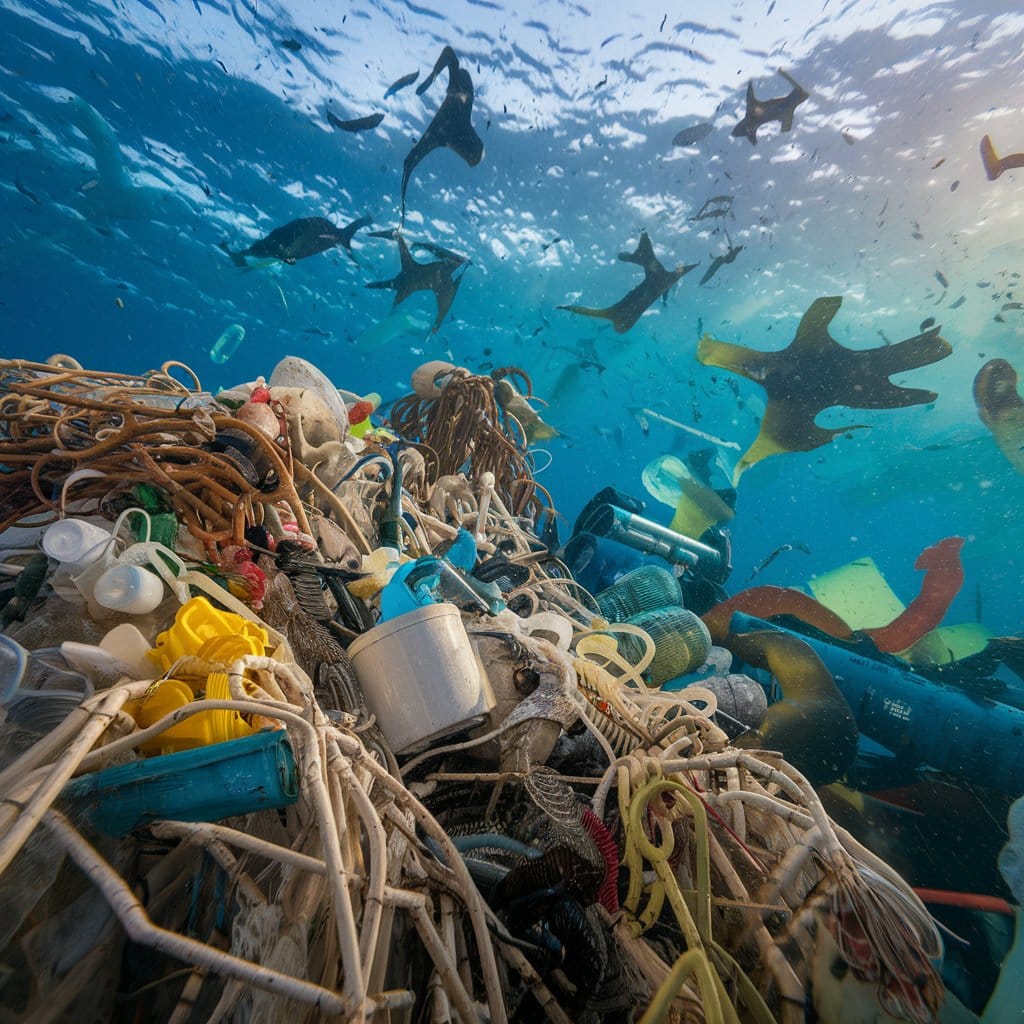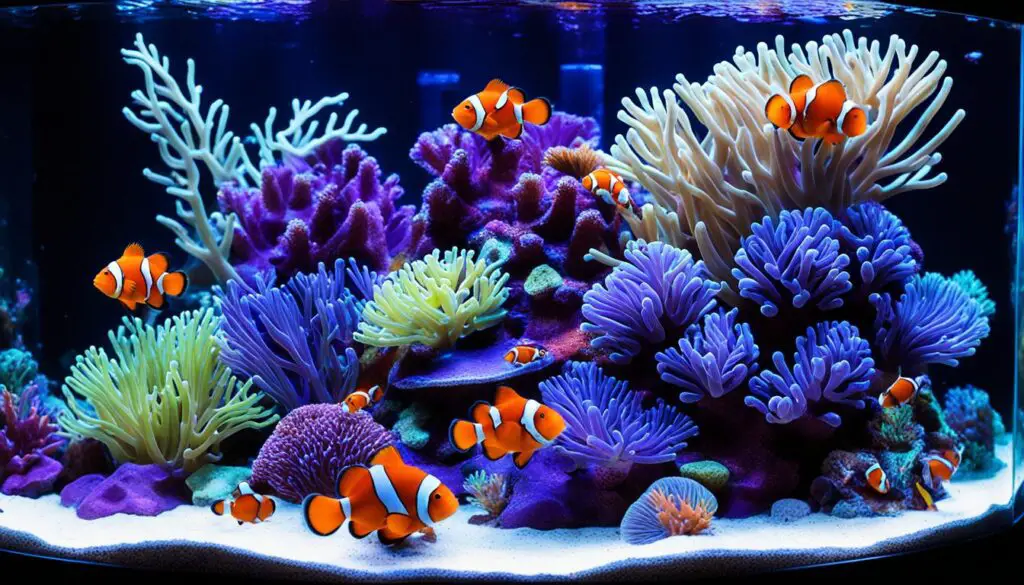What Is The Difference Between Squid And Octopus

Introduction
What Is The Difference Between Squid And Octopus: Squid and octopus are fascinating marine creatures that belong to the class Cephalopoda, and while they share many similarities, they also exhibit distinct differences in their anatomy, behavior, and ecological roles. Understanding these disparities can enhance our appreciation of the diverse wonders of the ocean.
To begin with, squid and octopus live both possess elongated bodies with soft, gelatinous tissues, and they are renowned for their incredible ability to change color and texture for camouflage and communication. However, the most noticeable difference between the two lies in their physical appearance. Squid have a streamlined, torpedo-like shape with a distinct head and mantle, often equipped with long tentacles and shorter arms equipped with suction cups. Octopuses, on the other hand, have rounded bodies with a bulbous head and eight long, flexible arms, typically without tentacles.
These distinctions extend into their ecological roles and culinary uses, making the comparison between squid and octopus a subject of intrigue for marine enthusiasts, scientists, and food connoisseurs alike. In this exploration, we will delve deeper into the nuanced distinctions that set these cephalopods apart, shedding light on the captivating world of squid and octopus.

Is squid and octopus the same thing?
Octopuses have round bodies and eight sucker-covered limbs. Squids have a more triangular shape and 10 limbs—eight arms and two tentacles. Both range in size, but the largest squids (around 60 feet) are far larger than the biggest octopuses (around 16 feet).
Squid and octopus are not the same thing; they are distinct marine creatures with several key differences in their anatomy, behavior, and ecological roles. While they belong to the same class, Cephalopoda, they diverge in several significant ways:
- Physical Appearance:
- Squid: Squid typically have a streamlined, elongated body resembling a torpedo. They possess a distinct head and mantle, which houses their internal organs. Squid have two long tentacles and eight shorter arms, all equipped with suction cups.
- Octopus: Octopuses, on the other hand, have a rounded body with a bulbous head. They have eight long, flexible arms, which are often lined with suckers, but they lack the tentacles found in squid.
- Culinary Uses:
- Squid and octopus are both popular ingredients in many cuisines around the world. However, their different textures and flavors make them suitable for distinct culinary applications. Squid is often used in dishes like calamari, with a firmer and somewhat chewy texture. Octopus, when properly prepared, can be tender and is featured in various Mediterranean and Asian dishes.
While squid and octopus share the same class, they are separate and unique species with differences in physical characteristics, behaviors, ecological roles, and culinary uses. Understanding these distinctions enhances our appreciation for the diversity of life within the ocean and the fascinating world of cephalopods.
Is a squid or octopus family?
A cephalopod is an animal belonging to the group Cephalopoda, containing octopus, squid, cuttlefish, nautilus, and kin. The word “cephalopod” is derived from Greek and means “head foot,” which perfectly describes animals that have eyes just above their many limbs.
Squid and octopus are not considered a single family but rather separate families within the class Cephalopoda. Cephalopoda is a diverse class of marine animals that includes not only squid and octopus but also cuttlefish and nautilus. Within this class, various species are further categorized into different families, genera, and species based on their specific characteristics and evolutionary relationships.
Squid belong to the family Loliginidae (commonly referred to as “true squids” or “calamari”). Loliginidae includes species like the common squid (Loligo vulgaris) and the Atlantic brief squid (Lolliguncula brevis), among others.
Octopus, on the other hand, belong to the family Octopodidae, which includes a wide range of octopus species. Some well-known octopus species are the common octopus (Octopus vulgaris) and the blue-ringed octopus (Hapalochlaena species).
Both squid and octopus families have their own unique characteristics, and they are distinct from each other in various ways, as described in the previous answer. While they share the same class (Cephalopoda) due to their common evolutionary ancestry, they have evolved separately along distinct lines to adapt to different ecological niches and environments in the ocean.
Squid and octopus are not a single family; they are separate families within the broader class of Cephalopoda, representing different branches of the cephalopod evolutionary tree.
What’s better octopus or squid?
Many people find Octopuses to taste very rich. Squid meat is tougher and smoother – but is tender and firm when cooked, allowing it to soak up flavors or fry into delicious ringlets known around the globe as calamari.
The question of whether octopus or squid is “better” is subjective and largely depends on personal preferences, culinary applications, and individual tastes. Both octopus and squid are delicious and versatile seafood options, each with its own unique qualities. Here’s a detailed comparison to help you decide which one might be better for your specific needs:
- Octopus:
- Texture: When properly prepared, octopus can have a tender and slightly chewy texture. It’s often enjoyed for its meatiness and succulence.
- Flavor: Octopus has a mild, slightly sweet, and briny flavor that readily absorbs the flavors of seasonings and marinades.
- Culinary Uses: Octopus is commonly featured in Mediterranean cuisine, where it’s often grilled, braised, or stewed. It’s a popular ingredient in dishes like Spanish octopus salad, Greek octopus stew, and Italian octopus carpaccio.
- Versatility: Octopus is versatile and can be prepared in various ways, from simple grilling to complex dishes, making it suitable for both casual and gourmet cooking.
Ultimately, whether octopus or squid is “better” depends on your culinary preferences and the specific dish you want to create. If you prefer a tender, meaty texture and a mild, sweet flavor, octopus might be your choice. On the other hand, if you enjoy a slightly chewy texture and versatility in cooking methods, squid could be the better option. Many people appreciate both seafood options and choose them based on the recipe and their mood.
Is a squid a baby octopus?
You wouldn’t be alone if you thought the octopus and squid were the same animals. They are cousins—both part of the group cephalopoda—a group of marine mollusks that include squid, octopus, nautilus, and snails. The largest cephalopod is the giant squid and the smallest being the pygmy squid.
A squid is not a baby octopus. Squids and octopuses are two distinct and separate marine creatures, each belonging to different families within the class Cephalopoda. They are not stages in the life cycle of one another. Here’s why they are different:
- Species and Families: Squids belong to the family Loliginidae or Teuthida (commonly referred to as “true squids”), while octopuses belong to the family Octopodidae. These families are separate branches of the cephalopod evolutionary tree.
- Anatomy: Squids and octopuses have different physical characteristics. Squids typically have a streamlined, torpedo-like body with two long tentacles and eight shorter arms, all equipped with suction cups. Octopuses, on the other hand, have a rounded body with eight long, flexible arms, often lined with suckers, but they lack tentacles.
- Life Cycles: Squids and octopuses have distinct life cycles. Both undergo complex metamorphoses, but their developmental stages are unique to their respective species. Squid larvae do not transform into octopuses, and vice versa.
While squids and octopuses are both fascinating cephalopods with some shared characteristics, they are not interchangeable, and one does not evolve into the other. They are separate and unique species with their own evolutionary history, anatomy, life cycles, and ecological roles in the marine environment.
Can I substitute squid for octopus?
Squid is a popular alternative to octopus and can be found in many dishes worldwide. With a slightly more tender texture than octopus, it still provides a similar mouthfeel. Plus, the taste is quite comparable, making it a fitting substitute.
While squid and octopus share some similarities as both being cephalopods, they are distinct in terms of texture, flavor, and cooking properties. Whether you can substitute squid for octopus depends on the specific recipe and your preferences, but it’s to consider the differences:
- Texture:
- Squid: Squid typically has a firmer and somewhat chewy texture, especially when cooked quickly, such as in frying (as in calamari).
- Octopus: Octopus, when properly prepared, can have a tender and slightly chewy texture. It is often slow-cooked to achieve this tenderness.
- Flavor:
- Squid: Squid has a mild, slightly sweet flavor with a hint of oceanic brininess. It readily absorbs the flavors of seasonings and marinades.
- Octopus: Octopus has a mild, sweet, and briny flavor that also takes on the flavors of seasonings well.
Given these differences, you can substitute squid for octopus in certain recipes, particularly those where the texture difference is not a significant concern. For instance, you could use squid in place of octopus in a stir-fry or a lightly cooked seafood salad.
However, if a recipe specifically calls for slow-cooked tender octopus, such as a braised dish, substituting with squid may result in a less desirable texture. Ultimately, the choice to substitute squid for octopus depends on your personal preferences and the nature of the dish.
What’s another name for octopus or squid?
Cephalopod
Cephalopod literally means ‘head foot’ and members of this group, including octopuses, cuttlefishes, squids and nautiluses, have their foot or tentacles connected to their head, not their body. Cephalopods have the most advanced nervous system of all invertebrate animals and are active hunters.
Octopus and squid are known by various names in different languages and regions, reflecting their widespread culinary and cultural significance. Here are some alternate names and terms for octopus and squid:
- Octopus (Alternate Names):
- Pulpo: In Spanish, particularly in Spanish-speaking countries, octopus is often referred to as “pulpo.” Dishes like “pulpo a la gallega” are popular in Spanish cuisine.
- Polvo: In Portuguese, octopus is called “polvo.” Portuguese cuisine features dishes like “arroz de polvo,” a flavorful octopus and rice dish.
2. Squid (Alternate Names):
- Calamari: In many Western countries, especially in restaurants, squid is often referred to as “calamari” when served in battered and fried rings. This term is widely recognized.
- Lula: In Portuguese, squid is called “lula.” It is used in dishes like “lulas recheadas” (stuffed squid).
- Ika: In Japanese, “ika” is the term for squid. Squid is a common ingredient in Japanese cuisine, used in dishes such as sashimi and tempura.
These alternate names reflect the cultural diversity of cuisines around the world and highlight the global appeal of octopus and squid in various culinary traditions. Depending on where you are and the context, you may encounter these alternative terms when discussing or ordering these delicious seafood options.
Who is more powerful octopus or squid?
In a fight, the squid will likely win because of its sleeker, streamlined body shape that allows it to move through the water faster. Octopi, on the other hand, are clumsier and slower-moving creatures.
Comparing the power or strength of octopuses and squids is a complex matter and depends on various factors, including the specific species, size, and context in which their abilities are evaluated. Here, we’ll explore some aspects of their “power” to provide a more nuanced understanding:
- Physical Strength and Musculature:
- Examining the muscular structures of octopuses and squids and how they enable these creatures to perform various tasks, such as capturing prey or propelling themselves in water.
2.Speed and Mobility:
- Analyzing the swimming capabilities and speeds of octopuses and squids and how these abilities contribute to their respective hunting and survival strategies.
3. Intelligence and Problem-Solving:
- Comparing the cognitive abilities of octopuses and squids, including their problem-solving skills, learning capabilities, and adaptive behaviors.
It’s challenging to definitively say whether octopuses or squids are more “powerful” as both possess unique strengths and adaptations suited to their respective lifestyles and ecological roles. Octopuses are known for their intelligence, versatility, and manipulative abilities, while squids, particularly certain species, are known for their speed and physical power.
The concept of “power” in the natural world is multifaceted and context-dependent, making it difficult to make a direct comparison between these two remarkable cephalopods.
Which is more intelligent squid or octopus?
It is believed that squids are slightly less intelligent than octopuses and cuttlefish; however, various species of squid are much more social and display greater social communications, etc., leading to some researchers concluding that squids are on par with dogs in terms of intelligence.
The question of whether squids or octopuses are more intelligent is a subject of ongoing scientific study and debate. Both squids and octopuses belong to the class Cephalopoda and are considered some of the most intelligent invertebrates on Earth. However, there are some distinctions in their intelligence, largely related to their evolutionary paths and ecological roles:
- Octopus Intelligence:
- Problem-Solving Abilities: Octopuses are renowned for their problem-solving skills. They can navigate mazes, open jars, and exhibit complex behaviors that suggest a high degree of cognitive flexibility. Some octopuses have even been observed using tools, such as coconut shells, for shelter.
- Camouflage and Mimicry: Octopuses have an incredible ability to change the color and texture of their skin, allowing them to camouflage themselves effectively and mimic their surroundings. This sophisticated camouflage is a testament to their perceptual and cognitive abilities.
- Squid Intelligence:
- Less Studied: Squids, in comparison to octopuses, have been less extensively studied for their cognitive abilities. This may be because they have different lifestyles and are often faster-moving creatures.
- Predatory Intelligence: Squids are primarily predators, and their intelligence is often focused on hunting and capturing prey. They have keen senses, sharp beaks, and powerful tentacles for capturing and subduing prey.
- Group Behavior: Some species of squid are known for their complex social structures and group behaviors. For example, the Humboldt squid exhibits schooling behavior, suggesting a level of coordination and communication among individuals.
Both squids and octopuses exhibit remarkable intelligence, but they have different types of intelligence adapted to their specific ecological niches and behaviors. Octopuses are often recognized for their problem-solving abilities, learning, and complex behaviors, while squids are known for their predatory intelligence and group behaviors.
It’s challenging to definitively say which is more intelligent as intelligence can manifest differently in various species. Further research is needed to fully understand and compare the cognitive abilities of these fascinating cephalopods.

Conclusion
The differences between squid and octopus, despite their shared classification within the cephalopod class, are striking and multifaceted. These distinctions encompass their physical characteristics, behaviors, ecological roles, and even culinary uses.
Squid are characterized by their streamlined bodies, long tentacles, and shorter arms with suction cups. They are agile swimmers, relying on jet propulsion to move swiftly through the water. In contrast, octopuses have rounded bodies, eight long, flexible arms, and are typically slower swimmers. They are renowned for their intelligence and adaptability, often employing cunning strategies for hunting and defense.
Ecologically, squids are integral components of marine food webs, serving as both predators and prey. Octopuses play similar roles but are often found closer to the ocean floor. Culinarily, these cephalopods offer distinct textures and flavors, with squid being firmer and octopus potentially achieving tenderness through slow cooking.



